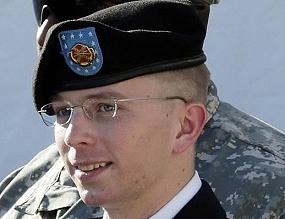Bradley Manning hearing focuses on unlawful pre-trial punishment

The Army’s pre-trial hearing resumed Tuesday against Bradley Manning, the 24-year-old private who is accused of leaking hundreds of thousands of classified military and government documents to the whistleblower organization WikiLeaks.
Manning is expected to speak this week about his nine-month confinement at the Quantico, Virginia Marine Corps prison. There he was held in isolation in a 6-by-8-foot cell more than 23-and-a-half hours a day. He was made to stay awake from 5 in the morning until 10 at night with nothing to do, forbidden even to exercise. Guards ordered him to strip naked and stand in humiliating positions in their presence. He was denied such basic items as eye glasses and bedding.
Manning’s testimony will be the first public comment by the former intelligence analyst in more than two years.
The pre-trial proceeding, known as an Article 32 hearing, is scheduled to run through Sunday, December 2 at Fort Meade, Maryland. It is the last in a long series of hearings before a full court-martial trial scheduled for February 4. Manning elected to be tried by a military judge, rather than by a jury.
Manning faces possible life imprisonment if he is convicted of “aiding the enemy” under the Espionage Act. He faces 22 separate charges for allegedly accessing classified information while stationed in Baghdad in 2009-2010.
Many of the files Manning is accused of leaking document war crimes by the US military, most notably a video published by WikiLeaks under the title “Collateral Murder” that captures a 2007 US helicopter attack on Iraqi civilians that left 12 dead, including children and two Reuters journalists. The military had characterized all of the dead as “enemies killed in action.” Other documents from Iraq showed tens of thousands of previously unreported civilian deaths and a formal military policy of covering up torture, rape and murder.
Tuesday’s proceedings focused on the testimony of commanders at Quantico. Wednesday will center on the testimony of behavioral health specialists at the brig.

























